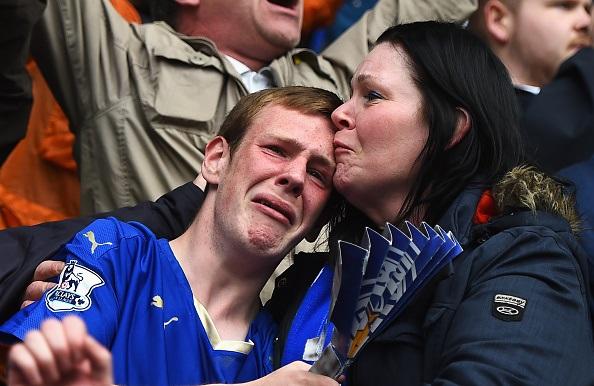This article was originally published on The Conversation. Read the original article.
Let me get this out of the way first off. I am a Liverpool fan, from Liverpool—a season ticket holder—who has now lived in the East Midlands of England, in Leicester, for more than 35 years. I know the route from Leicester to Liverpool’s ground at Anfield like better men know religion: M1, A50, M6, M62, Queens Drive Liverpool ring road, park up. Getting to evening games now is hell: motorway repair madness. But when something extraordinary happens—winning the Champions League in Istanbul in 2005, or the Reds gloriously beating Dortmund 4-3 recently—it all makes sense again. The hours, the money spent, the midnight traffic deadlock, the heartbreak—I will not forget Steven Gerrard’s title-denying slip versus dark-arts Chelsea in 2014. Never.
Subscribe now – Free phone/tablet charger worth over $60But mostly, back in the East Midlands, I have had these tortured contemplations of possible renewed football glory all to myself. You see, Leicester is not even really a football city. Rugby union team the Leicester Tigers are more successful, more feted in their own sport, and are well-supported locally. Tigers’ fans often patronise their lowly football neighbours. Jimmy Bloomfield, a much-liked Leicester City manager in the 1970s, complained bitterly that Leicester was essentially a rugby city, and one lacking a strong football identity. He was not wrong.
The city of Leicester’s recent history as a welcoming home for many South Asian people and other migrants has done much to promote positive diversity. Now, most South Asian kids grow up playing football—but watching the giants duel it out on television. Leicester remained in the shadow of much bigger domestic and European competitors. So we saw Arsenal, Chelsea, Liverpool, Man United and of course Barcelona shirts on kids of all backgrounds round our way more than we did Leicester City ones. Barring a brief spell of success under Martin O’Neill between 1995 and 2000, the Foxes did little to challenge the idea that Leicester was a second class football citizen. Until now that is.
Our house
My own household is full of active City followers—partners, sisters, brother-in-law, mother-in-law, even grandchildren. They have patiently listened to me complain over the years about my ridiculous Liverpool football woes and reminisce about the Reds’ titles and five European cups. Meanwhile City moved to a spruce new ground in 2002 and then lapsed immediately into administration and near-death with a £30m debt. Saved by the fans, the Foxes later slumped into the third tier of English football in 2008. Under manager Nigel Pearson, City eventually made it back into the Premier League, then survived an impossible relegation scare in 2015. This was their best possible place: Premier League relegation battlers, occasional cup run. Or so we thought.
We (Liverpool and City fans alike) have waited all season for this current preposterous 2015/16 Leicester football story to crash around our heads. We carefully mapped out the places where City would surely be “found out”: they never were. They just got stronger. Now managed by the genial, pizza-lovingItalian technocrat Claudio Ranieri, only we were able to answer the football pundit question of the moment: why did none of the “big” clubs in England have reliable on-field leaders? A: Because Leicester City have them all: Fuchs, Huth, Morgan, Drinkwater, Vardy.
These are all guys who have been undervalued elsewhere, underestimated, waiting their time and a sympathetic formation and boss. Together with the Algerian genius Riyad Mahrez and the diminutive French threshing machine N’Golo Kante they have produced a true collective and a way of playing that no opponent can yet fathom. (Leicester tee-shirt: “70 percent of the world is covered by water, the rest by N’Golo Kante”). Jamie Vardy’s own story is a Hollywood-outrageous rags-to-King Power epic, but special mention too is due to City’s indefatigable Danish goalkeeper Kasper Schmeichel. He snarls at his own fans, keeps out opposing forwards and produces drop-kick starts to most of Leicester’s best attacks—and Vardy’s goals. Goalkeeping will never seem the quite the same again.
A story for the world
The world’s sporting press has descended on Leicester these past weeks to try to explain this amazing tale, precisely because it is a story for the world and for all its sports. A collection of cast-offs and bargain buys moulded into a team of real skill, resilience and belief: honed into unlikely, yet extraordinary, winners. It even sounds like a movie script. And kids all around the globe might even latch on to “that club” in England that beat up those domestic giants. Of course, there is no point in trying to explain it—we just need to enjoy it, suck it up. Every fan of every club that has ever had its arse hanging out can look at what has happened here, and dream. My own household is just about on the point of joyous implosion. The locals actually painted Leicester blue over the weekend: I mean it.
And now this wonderful, crazy thing has finally happened, now this unconsidered club from nowhere-place has lifted the trophy and spat in the eyes of all thoseexpert doubters and sporting corporate behemoths, this Leicester-based Liverpool supporter is both tearful and incredibly proud—and chock-full of envy. “Where are you from mate?” “Me? I’m from Leicester!”
John Williams, Senior Lecturer in Sociology, University of Leicester














